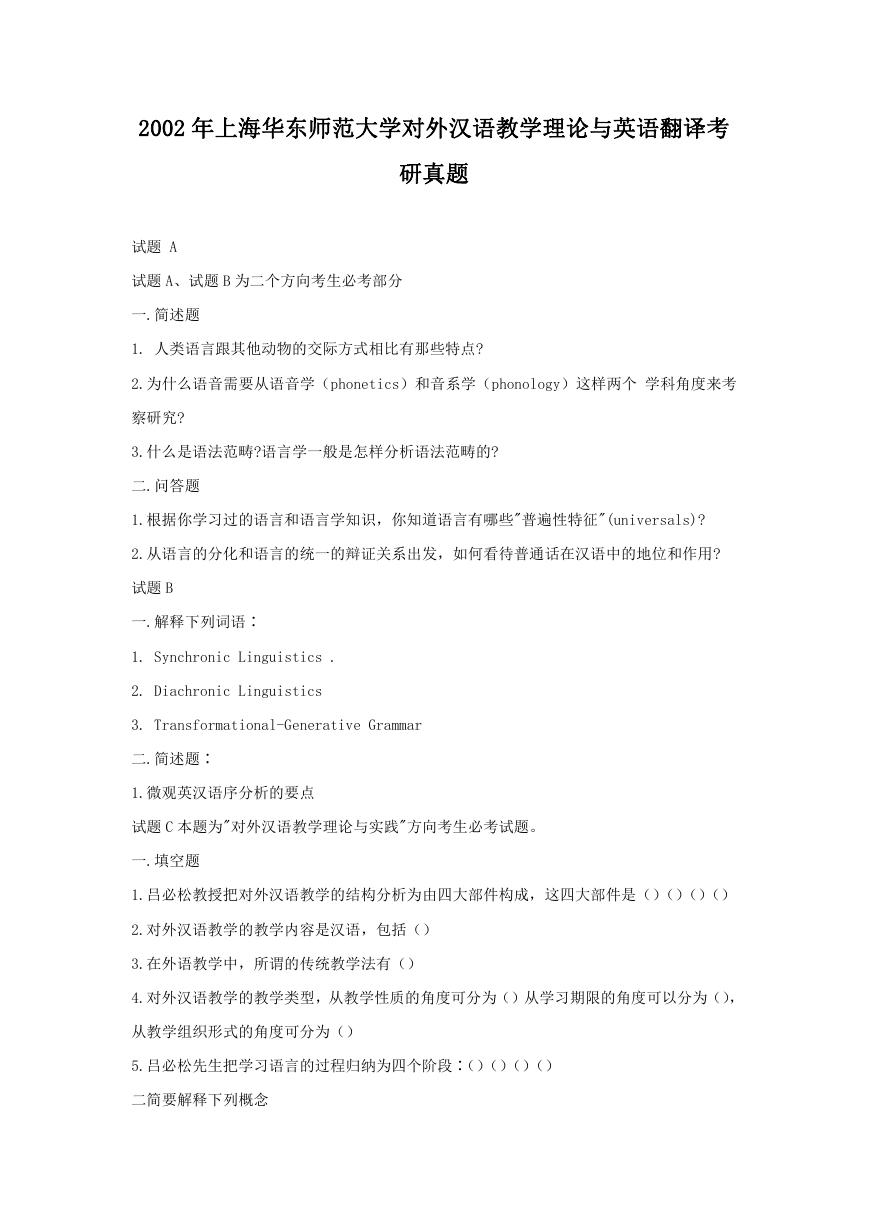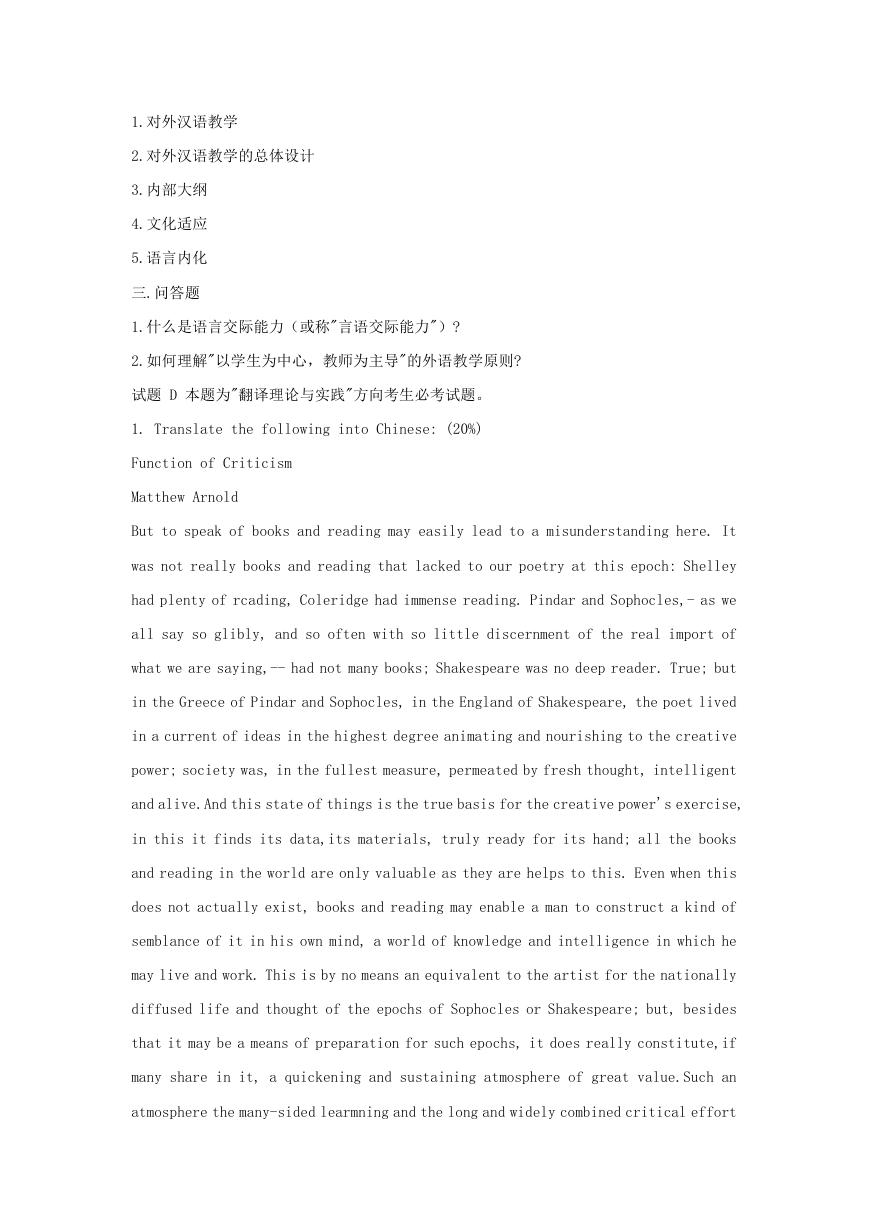2002 年上海华东师范大学对外汉语教学理论与英语翻译考
研真题
试题 A
试题 A、试题 B 为二个方向考生必考部分
一.简述题
1. 人类语言跟其他动物的交际方式相比有那些特点?
2.为什么语音需要从语音学(phonetics)和音系学(phonology)这样两个 学科角度来考
察研究?
3.什么是语法范畴?语言学一般是怎样分析语法范畴的?
二.问答题
1.根据你学习过的语言和语言学知识,你知道语言有哪些"普遍性特征"(universals)?
2.从语言的分化和语言的统一的辩证关系出发,如何看待普通话在汉语中的地位和作用?
试题 B
一.解释下列词语∶
1. Synchronic Linguistics .
2. Diachronic Linguistics
3. Transformational-Generative Grammar
二.简述题∶
1.微观英汉语序分析的要点
试题 C 本题为"对外汉语教学理论与实践"方向考生必考试题。
一.填空题
1.吕必松教授把对外汉语教学的结构分析为由四大部件构成,这四大部件是()()()()
2.对外汉语教学的教学内容是汉语,包括()
3.在外语教学中,所谓的传统教学法有()
4.对外汉语教学的教学类型,从教学性质的角度可分为()从学习期限的角度可以分为(),
从教学组织形式的角度可分为()
5.吕必松先生把学习语言的过程归纳为四个阶段∶()()()()
二简要解释下列概念
�
1.对外汉语教学
2.对外汉语教学的总体设计
3.内部大纲
4.文化适应
5.语言内化
三.问答题
1.什么是语言交际能力(或称"言语交际能力")?
2.如何理解"以学生为中心,教师为主导"的外语教学原则?
试题 D 本题为"翻译理论与实践"方向考生必考试题。
1. Translate the following into Chinese: (20%)
Function of Criticism
Matthew Arnold
But to speak of books and reading may easily lead to a misunderstanding here. It
was not really books and reading that lacked to our poetry at this epoch: Shelley
had plenty of rcading, Coleridge had immense reading. Pindar and Sophocles,- as we
all say so glibly, and so often with so little discernment of the real import of
what we are saying,-- had not many books; Shakespeare was no deep reader. True; but
in the Greece of Pindar and Sophocles, in the England of Shakespeare, the poet lived
in a current of ideas in the highest degree animating and nourishing to the creative
power; society was, in the fullest measure, permeated by fresh thought, intelligent
and alive.And this state of things is the true basis for the creative power's exercise,
in this it finds its data,its materials, truly ready for its hand; all the books
and reading in the world are only valuable as they are helps to this. Even when this
does not actually exist, books and reading may enable a man to construct a kind of
semblance of it in his own mind, a world of knowledge and intelligence in which he
may live and work. This is by no means an equivalent to the artist for the nationally
diffused life and thought of the epochs of Sophocles or Shakespeare; but, besides
that it may be a means of preparation for such epochs, it does really constitute,if
many share in it, a quickening and sustaining atmosphere of great value.Such an
atmosphere the many-sided learmning and the long and widely combined critical effort
�
of Germany formed for Goethe, when he lived and worked. There was no national glow
of life and thought there as in the Athens of Pericles or the England of Elizabeth.
That was the poet's weakness. But there was a sort of equivalent for it in the complete
culture and unfettered thinking of a large body of Germans. That was his strength.In
the England of the first quarter of this century there was neither a national glow
of life and thought,such as we had in the age of Elizabeth,nor yet a culture and
a force of learning and criticism such as were to be found in Germany. Therefore
the creative power of poetry wanted, for success in the highest sense, materials
and a basis; a thorough interpretation of the world was necessarily denied to it.
2.Translate the following into English: (20%)
公 墓
穆时英
那天我从公墓里出来,在羊齿植物中间的小径上走着,却见她正从对面来了。便端详了
她一眼。带着墓场的冷感的风吹起了她的袍角,使她头发上吹动了暗暗的海,很有点儿潇洒
的风姿。她有一双谜似的眼珠子,苍白的脸,腮帮儿上有点焦红,一瞧就知道是不十分健康
的。她叫我想起山中透明的小溪,黄昏的薄雾,戴望舒先生的《雨巷》,蒙着梅雨的面网的
电器广告。以后又碰到了几次。老瞧见她独自个儿坐在那儿,含着沉默的笑,望着天边一人
块一大块的白云,半闭着的黑水晶藏着东方古国的秘密。来的时候总是独自个来的,只有一
次我瞧见她和几位跟她差不多年龄的姑娘到她母亲墓旁的墓地上野餐。她们大声地笑着,谈
着。她那愉快的笑是有传染性的,大理石,石狮子,半折的古柱,风名草,全对我嚷着∶
" 愉快啊-四月,恋的季节!"
我便"愉快啊"那么笑着;杜鹃在田野里叫着丁香的忧郁,沿着乡下的大路走到学校里,使忘
了饥饿地回想着她广东味的带鼻音的你字。为了这你字的妩媚我崇拜着明媚的南因。
接连两天没瞧见她上公墓去,她的母亲的那座坟是寂寞的,没有花。我坐在母亲的墓前,低
下了脑袋忧郁着。我是在等着谁-等一声远远儿飘来的天主堂的钟,等一阵晚风,等一个紫
色的朦胧的梦。是在等她吗?我不知道。干时儿等她呢?我并不认识她。是怀念辽远的母亲吗?
也许是的。可是她来了,便会"愉快啊"那么地微笑着,这我是明白的。
�






 2023年江西萍乡中考道德与法治真题及答案.doc
2023年江西萍乡中考道德与法治真题及答案.doc 2012年重庆南川中考生物真题及答案.doc
2012年重庆南川中考生物真题及答案.doc 2013年江西师范大学地理学综合及文艺理论基础考研真题.doc
2013年江西师范大学地理学综合及文艺理论基础考研真题.doc 2020年四川甘孜小升初语文真题及答案I卷.doc
2020年四川甘孜小升初语文真题及答案I卷.doc 2020年注册岩土工程师专业基础考试真题及答案.doc
2020年注册岩土工程师专业基础考试真题及答案.doc 2023-2024学年福建省厦门市九年级上学期数学月考试题及答案.doc
2023-2024学年福建省厦门市九年级上学期数学月考试题及答案.doc 2021-2022学年辽宁省沈阳市大东区九年级上学期语文期末试题及答案.doc
2021-2022学年辽宁省沈阳市大东区九年级上学期语文期末试题及答案.doc 2022-2023学年北京东城区初三第一学期物理期末试卷及答案.doc
2022-2023学年北京东城区初三第一学期物理期末试卷及答案.doc 2018上半年江西教师资格初中地理学科知识与教学能力真题及答案.doc
2018上半年江西教师资格初中地理学科知识与教学能力真题及答案.doc 2012年河北国家公务员申论考试真题及答案-省级.doc
2012年河北国家公务员申论考试真题及答案-省级.doc 2020-2021学年江苏省扬州市江都区邵樊片九年级上学期数学第一次质量检测试题及答案.doc
2020-2021学年江苏省扬州市江都区邵樊片九年级上学期数学第一次质量检测试题及答案.doc 2022下半年黑龙江教师资格证中学综合素质真题及答案.doc
2022下半年黑龙江教师资格证中学综合素质真题及答案.doc